#i mean i'm not saying it's impossible that a dude or nb person will do it for me irl
Explore tagged Tumblr posts
Text
I could make a funny joke about all mspec lesbian's problems but I thought of something for something I only know that I experience. So.
Mspec lesbian with no respect for the opinions of others, or respect for the feelings of others if I think their feelings are invalid (which is probably related to the low empathy) problems is other people telling me shit about experiences we both have and deciding only my feelings on the matter have any value because I have the correct opinion obviously.
"Listen to lesbians" I am a lesbian too. We have the same experience with attraction. Neither of us like dudes. I say it's okay for lesbians to like dudes sometimes. I get to decide this because I'm correct. "Mspec lesbians hurt nonbinary people, signed an nb lesbian" I'm a nonbinary lesbian too. I think people being attracted to women and nb people at the same time and saying that's NOT mspec is misgendering. My feelings matter more because they make more sense, yours contradict each other and are stupid. "It's appropriating aspecs" umm actually I'm aspec, I'm ace and arospec and maybe aplspec and I think you're promoting the relationship hierarchy and also saying sex and romance can't be fully separated so you're aphobic. "Your label feels invalidating :(" your hate feels invalidating too. But I'm not doing anything to you personally so your feelings are your problem and Not My Fault. They're also objectively incorrect so you don't deserve to feel them. My feelings, you are intentionally causing by going out of your way to harass me or post hate about my identity, therefore they are also a you problem and Your Fault. I have a right to feel them because you are being mean to me.
I have high compassion but it is very conditional. I gotta think someone's feelings are justified to care. And I know a lot of the things I express above (like "your feelings aren't valid so you don't deserve to feel them") are impossible and irrational but it's how I think and hence why this is an mspec lesbian problem and not mspec lesbian culture.
19 notes
·
View notes
Text
I'll be damned if I said I understood this series, but I'll throw something in about what Kanba sharing the apple with Shoma means. As stated, this series is very much about love.
Now I ask you, what love is there in a world that puts continuous prices on human lives, as Sanetoshi and private health insurance do throughout the show? What love is there in a cult?
In short, I think the apple is a collective love.
We're often raised with the notion of "Blood is thicker than water." But really, it's "The blood of the covenant is thicker than the water of the womb." What it means is, the connections you choose to forge say more about you than the ones into which you were born. But it's also more complex than that. What you're born into shapes who you are and even what choices you make. Oftentimes, people who were abused as children will go on to abuse other people. And yet there are also many people who were raised with loving families who still go on to commit terrible things, and there exist many who are the inverse, people who were raised by terrible parents who still choose to do good. It's both true that we are molded by our surroundings, but we still make choices at our own will (if we ignore the extortion and violence of poverty).
We love to say "Disturb the comforted, comfort the disturbed," but the truth is we are all mixes of it. I'm NB but I was still raised a dude. I had to work out a lot of what I had been taught. And while I never physically harmed anyone, I still feel some dread and culpability hearing what women go through. As sympathetic and understanding as I am, I'm not beyond reproach. I "get it" from an outsider's perspective. I can still relate to anyone regardless of category, but I also must keep in mind how different experiences can be. I was still raised with the comfort of not being sexualized as a child, as little girls often are (obviously boys still face SV, I'm just saying that the experience isn't the same). I still get disturbed in a particular way when I watch something like Revolutionary Girl Utena or Moral Orel, because these are things I don't personally face. Even though I don't commit terrible acts like Akio and the residents of Moralton, I still have to confront these things in order to participate in its dismantling. I still have to reach out. The sacrifice is my comfort and previous understanding in order to grow as a person and help and understand others.
There's a fundamental contradiction to the human condition. The Takakura parents were seemingly normal and almost texbookly loving, and yet they were part of the Kiga group, and Kenzan went on to commit an act of terror.
This "comfort" I had, the "privilege" of more than likely not facing SV if I were to take a walk out at night, also comes at a "price": I had to conform to the ideas of "boy" and "man" which did nothing but stifle me.
I think the apple represents unconditional love, a Tolstoyan love, one not bound by personal biases. Tabuki had to conform to his mother's idea of talent, intelligence, while Yuri had to conform to her father's idea of beauty. But of course, these are all impossible standards set upon fluid, abstract concepts. They are inherently inhuman ideals born not from a love of humanity but the exaltation of a non-existent archetype, of a past that never existed, hence the dealing with the economic crisis.
Sanetoshi doesn't hold a gun to Kanba's head but he still extorts him to do his bidding, to carry out another cycle of violence for a fiery cleansing of the world. Sanetoshi permits Himari to live not because she is human, but because someone is willing to work for him in exchange. No one in this society is given that unconditional love. The condition is you must conform to the cogs which make the system turn.
Kanba asked nothing of Shoma when he split the apple and handed the other half to him.
A child is born with no state of mind Blind to the ways of mankind God is smilin' on you but he's frownin' too Because only God knows what you'll go through You'll grow in the ghetto livin' second-rate And your eyes will sing a song of deep hate The places you play and where you stay Looks like one great big alleyway You'll admire all the number-book takers Thugs, pimps and pushers and the big money-makers ---The Grandmaster Flash and the Furious Five
For as self-centered as children are due to their very nature, they're still purer, in a sense, than most adults. I've always had anger problems due to the environment in which I was raised, but people still call me empathetic and caring, because I still make that effort. Kanba made a grand gesture by offering Shoma the apple. It shows he cares. And there was no condition to it. Kanba asked for nothing in exchange. He saw a human being in need of help like him, and when he was blessed, he decided to share. As horse-girl-anthy writes, Kanba would later go on to resent Shoma due to the fact Shoma had such a loving family and yet Shoma disowned his parents upon learning of their original sin. Kanba, the orphan taken into the Takakura family, resented how Shoma disowned them because he saw it as ungrateful and selfish because Shoma possessed that of which Kanba had been dispossessed. For as illogical as it is, you and I can't fully blame him. We understand where he's coming from in spite of the Walter White of it all with his trapping and strapping.
There are many differences between them as little children and as we find them as teenagers in the show, but one of the main differences is that neither one of them had been shaped by society yet. That's why Shoma leant a hand to Himari, why Momoka leant a hand to Tabuki. We're told we're inherently selfish and cruel. I'd say humans aren't any one thing, neither inherently good nor evil. To subscribe to any essentialism is to erase any collective responsibility we have about the world and for each other.
I still have trouble understanding the sins of the father current of the series, but I think the ultimate punishment in life is how finite our existences are.
"Whenever I start thinking of my love for a person, I am in the habit of immediately drawing radii from my love - from my heart, from the tender nucleus of a personal matter- to monstrously remote points of the universe. Something impels me to measure the consciousness of my love against such unimaginable and incalculable things as the behaviour of nebulae (whose very remoteness seems a form of insanity), the dreadful pitfalls of eternity, the unknowledgeable beyond the unknown, the helplessness, the cold, the sickening involutions and interpenetrations of space and time." ---Vladimir Nabokov Speak, Memory
No matter what we do, we'll die. Death is the one guarantee in life. The greatest irony of life is the intensity with which we love, with which we burn, and yet it will all turn to vapors and disappear. We construct things like God in order to give our suffering meaning. But we also imbue God with our authority. God oftentimes becomes a thought-terminating cliche and ad hoc justification. But atheists also have similar mental workings, hence why the atheist movement in the U.S became reactionary after 9/11.
For as much as Sanetoshi talks about the cruelty of the world, for as right as he is to bemoan businessmen and the cogs of society, he is not a solution in himself. Atheists have a point in criticizing Christians and Christianity, but they fall into the same trappings. The Christian man says women belong in the kitchen because God decreed it so. The atheist says women belong in the kitchen because she has a womb. Both, in spite of their seeming opposition, believe in capitalism and complimentarianism and other institutions.
I think this is why Kanba ended up going Kiga rather than Shoma. You'd expect the biological son whose parents participated in the original incident to go that route, but no, it was Kanba. Everyone is fighting against the cruelty of the world and life itself. The core struggle is finding meaning and love. But we all suffer the collective punishment of death, of eventually turning to ash. We just also live in a world filled with inequality and alienation.
Shoma felt responsible, because as a descendant he kind of is. What his parents did is his cross to bear. But he's the one who made Himari a Takakura. The Penguindrum ended up being the siblings' bond. This means what they had to sacrifice in order to keep Himari alive was the end of their bond. And yet in spite of that, in spite of the fact that they no longer know each other, a remnant remains, a spirit of their love. That's why the stuffed animal remains. The sacrifice was hard and unideal, but Kanba and Shoma truly cared for Himari. The true test, the true exhibition of their love, of their sharing of the apple, was sacrificing their bond in order to give her a normal life. There is no exchange there. There is no reward. They wanted to lift the curse of their parents and paid the price. And yet even in that do-over, Himari feels the spirit of that love, hence why she cries.
She feels love beyond a death she knows nothing about, a love that transcends space and time. That's the pure love we all seek. Kanba sharing the apple was the start of this. I think that's why that scene isn't revealed until so close to the end. It's meant to be paralleled.
I hope I made sense, My mind has been sloshing with this series, so I hope I managed to give my thoughts some sensical form.
Night on the Galactic Railroad, or the Apple, the Scorpion, and the Stars
From a series on Mawaru Penguindrum’s literary influences.
This place is cursed with spoilers.
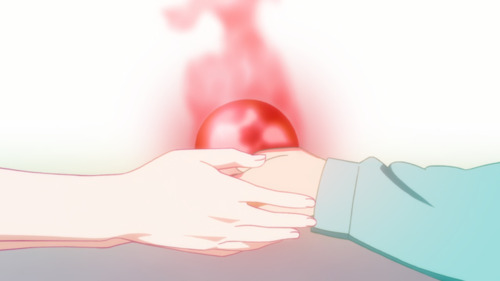
Night on the Galactic Railroad (1927) is a novella by Kenji Miyazawa. It takes place in the fictional fairy tale country resembling Italy. There, on the night of the annual Centuarus Festival, two boys, Giovanni and Campanella, are whisked away on the titular Galactic Railroad to tour the heavens. While on this journey, they confront the nature of human connection, transience, and sacrifice. At the end of the story, Giovanni and Campanella part ways. Campanella was on the train because he drowned during the festival and was on his way to the afterlife, while Giovanni, still alive, was allowed on the journey with his friend.
Mawaru Penguindrum specifically seems to be influenced by the 1985 anime adaptation directed by Gisaburo Sugii. It’s a faithful adaptation, but it plays up the story’s somber parts. The darkness at Penguindrum’s core seems borrowed from this version of the story rather than the original. Shouma and Kanba resemble Giovanni and Campanella as realized in this version.

Giovanni (right) and Campanella (left) on the Galactic Railroad.
Like Giovanni, Shouma is associated with the color blue and has a sensitive, demure personality. Like Campanella, Kanba is associated with red and is determined, distant, but ultimately devoted to his friends. Unlike NotGR, however, Shouma and Kanba depart together at the end. It seems to me as if Ikuhara has dwelt on the sadness of Giovanni and Campanella’s parting at the end of the original story and, in Penguindrum, created a version where they could be together in the end. Penguindrum also explicitly references Kenji Miyazawa in its first and last scenes. Near the beginning of the first episode, a pair of children are walking out side the Takakura’s home discussing what the apple means in NotGR. You can tell because they mention Campanella and someone named Kenji - the novella’s author Kenji Miyazawa. This exact conversation repeats in the final moments of the last episode, but this time the boys have Shouma and Kanba’s hair colors and the audience follows them as they keep walking into the stars.
THE SCORPION FIRE
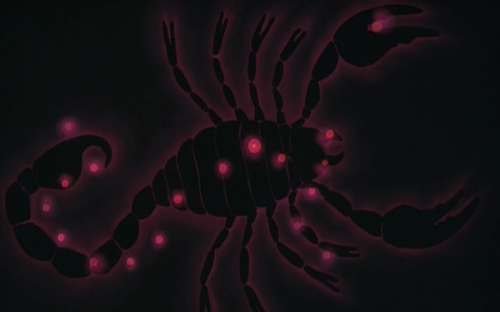
Night on the Galactic Railroad also contains the explanation for that scorpion metaphor! A lot of people get stuck on this - Kanba is referred to as a scorpion several times throughout Penguindrum, and allusions are made to him burning up. This is actually direct reference to NotGR, where the story of the burning scorpion exists as a fable told to the main characters as they’re on the train. You can see it in this clip:
“"My father told me its story: A long time ago in a field there lived a scorpion that ate other bugs by using its tale to catch them. Then one day he found himself cornered by a weasel. Fearing for his life, he ran but could not escape it. Suddenly, he fell into a well and, unable to climb out, began to drown. He started to pray then, saying:
”‘Oh, God. How many lives have I stolen to survive? Yet when it came my turn to be eaten by the weasel, I selfishly ran away. And for what? What a waste my life has been! If only I’d let the weasel eat me, I could have helped him live another day. God, please hear my prayer. Even if my life has been meaningless, let my death be of help to others. Burn my body so that it may become a beacon, to light the way for others as they search for true happiness.’
“The scorpion’s prayer was answered, and his body became a beautiful crimson flame that shot up into the night sky. There he burns to this day. My father was telling the truth…”
From Night on the Galactic Railroad, translation by Julianne Neville.
The fable of the scorpion fire is about sacrifice. The scorpion, who lived his life as a foul predator, faces something more powerful than him - the inevitability of death - and regrets that, after a life of heedless consumption, he couldn’t die in a way that aided the proliferation of life. The gods hear his prayers and set him on fire, turning him into the red star Antares, heart of the constellation scorpio, whose light aids life.
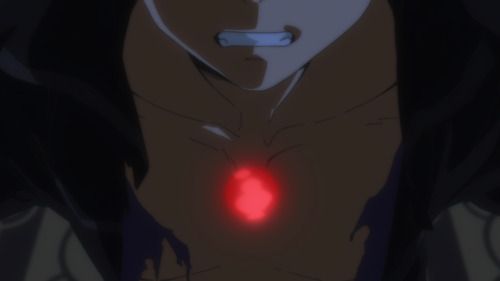
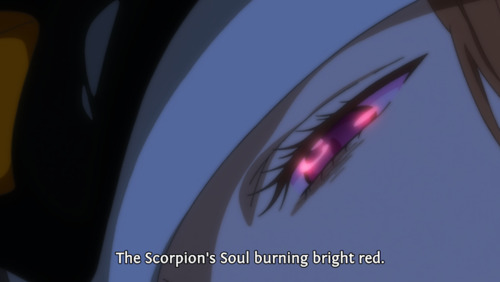
From episode 12. Kanba offers his life to the Princess of the Crystal’s in exchange for Himari’s and, due to the purity of his sacrifice, it is acceptable. Unlike later on in the series, here Kanba is exhibiting the true nature of sacrifice.
This fable gives insight into Kanba’s motivations but not his actions. While the scorpion discovers his kinship with all life, Kanba is rushing headlong towards a sacrifice that nobody wants but him. Kanba views himself as a predator and wants his final, massive act of predation - the terrorist attack - to lead to some concrete good: extending Himari’s life. His role as a man of action rather than a man of reflection (Shouma) binds him to Sanetoshi’s will, which offers a convenient means of achieving his goal. But those outs don’t exist in the real world, and these justifications can’t be made ahead of time. Shouma knew this and Kanba should have known. Maybe that’s why it’s Shouma, the brother with a more intuitive understanding of sacrifice, who bursts into flames and not Kanba, who fades away. Kanba’s identification with the scorpion represents misguided, emotionally selfish sacrifice - egoism - while Shouma, Ringo, and Momoka’s association with the purer flame represents true, transcendent sacrifice.
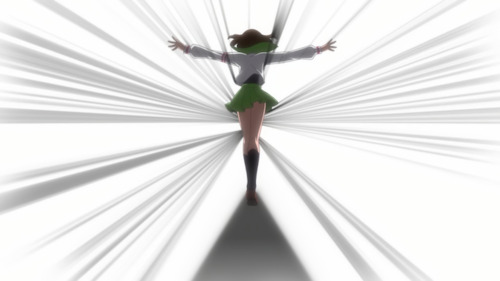

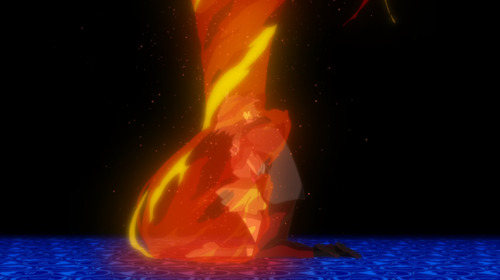
From episode 24. Ringo casting the spell (“Let’s share the fruit of fate!”) and subjecting herself to the scorpion fire.
THE APPLE
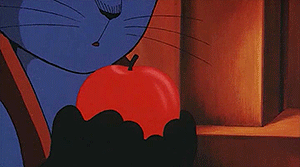
There’s a scene late in the novella where Giovanni and Campanella encounter some people who died on the Titanic. The trio consists of two children and their governor, who allowed them all to die to make room for more people on the lifeboat. These people tell Giovanni and Campanella about the scorpion fire, and this is also where apples come into play. A lighthouse keeper, traveling down the train, gives them some apples, which they disperse amongst themselves. The film actually makes it so that the flocks of birds that they see flying outside the windows turn into the apples - something that wasn’t present in the original story. Apples as a metaphor for live sacrificing itself for the sustenance of more life seems to originate here, since that wasn’t tied to the apples in the original story.

Christianity, apples symbolize knowledge and defilement. NotGR however, reclaims that image. Here, they represent people understanding their limitations as individuals and accepting community - and the necessity of making sacrifices for humanity’s greater good - as a way to make up for their flaws. NotGR stresses over and over again that people value humanity or some abstract conception of “life” over themselves, and that this path leads to profound spiritual contentment. Penguindrum borrows this idea and the apple symbolism wholeheartedly, but emphasizes valuing one’s interpersonal relationships as a proxy for loving all life.
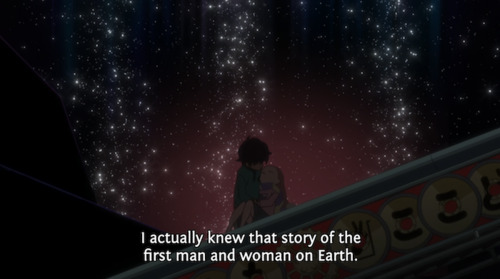
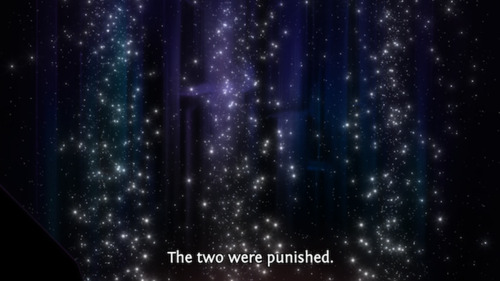
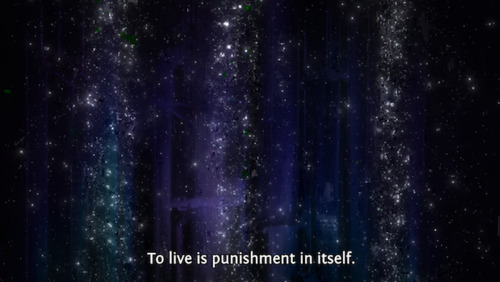
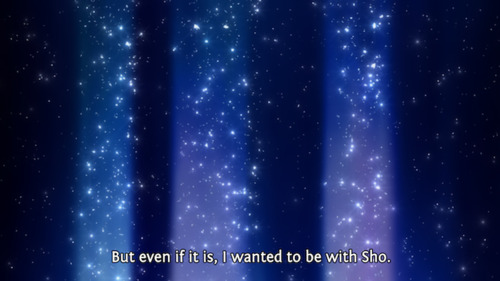
From episode 20. Himari reinterprets the biblical Fall of Man as a good thing because it allowed humanity to experience connection and joy, however transient, alongside pain.
One of the biggest mysteries left in Penguindrum to me is what Kanba sharing the apple with Shouma represents. I know what happened between Shouma/Himari and Kanba/Himari. Shouma brought the abandoned Himari into his family and Himari brought Kanba into the family after his father’s death. But what happened between Kanba and Shouma? How did Kanba have to save Shouma by sharing his fruit of fate? It’s left purely abstract - Shouma and Kanba were starving, Kanba shared his fruit, and both were saved by the gesture. Maybe Kanba helped Shouma by being assertive and dedicated in situations where he wasn’t naturally inclined towards that? Like Giovanni and Campanella, Kanba and Shouma have complementary existences. Giovanni couldn’t exist on his own without adopting some of Campanella’s traits, while Kanba and Shouma, although they acquiesce to each other a bit, ultimately reaffirm their paired existence. I opened this up to discussion with some people on twitter and Bryan Baxter suggested that the two boxes Kanba and Shouma are in during episodes 23 and 24 are their mothers’ wombs, and that by sharing the fruit of fate they became spiritual twins (they were born on the same day). Yoni Linder suggested that Kanba helped Shouma survive the KIGA group’s brainwashing when they were children. It is odd that Shouma, the Takakura actually born into the cult, is the one least susceptible to it.
The idea that there’s something beyond what we consider life is central to NotGR, which uses Christian imagery and often seems overtly Christian in its themes. Kenji Miyazawa was a devout practitioner of Nichiren Buddhism, but like many Japanese people his life was saturated with Christian imagery and scraps of biblical scripture. Christianity exists and is portrayed positively in NotGR, but neither Giovanni nor Campanella seem to be practitioners. When Giovanni and the children get into an argument over whose god is “real,” the tutor reconciles them by raising the possibility that their gods are one and the same and reminding them that the point of religion is true faith in what you believe. NotGR is thus a neutral but positive synthesis of Christian and Buddhist images towards a more generically humanist message.
“"And who says he’s the real God? I’ll be he’s a fake!”
“How would you know? Maybe the God you believe in is the fake.”
“No! He’s the real one!”
“Then tell me, what kind of God is your God?” asked the young man with a gentle smile.
“Well… to be honest, I’m not quite sure… but I do know he is the one true God,” Giovanni replied.
“Of course he is. There’s only one true God.“
"And my God is that one!”
“I agree. I can only pray that the two of you are seeing us off before that true God now,” the young man said, clasping his hands together. Kaoru also clasped her hands together.
Everyone was sad to be parting, and Giovanni was about to burst into tears.“
From Night on the Galactic Railroad, translation by Julianne Neville.
Over time, it becomes clearer and clearer that one of the railroad’s purposes is to deliver people to the afterlife, two of which are represented by giant glowing crosses. "Dying for love” thus means something more concrete in NotGR than it does in Penguindrum. There’s an actual reward for doing it - entrance into heaven. The same isn’t true in Penguindrum, where the existence of an afterlife is much more abstract. Sanetoshi and Momoka were humans with some supernatural powers who died and became ghosts, but that form of afterlife seems much more a curse than a reward. In the last episode, Momoka vanishes from this world for good through some sort of opening, but exactly where she goes is unknown. Penguindrum’s final shot is of Shouma and Kanba, having died for love, walking into the stars. While characters do allude to god, the show as a whole seems nonreligious, more concerned with taking the aspects of stories it deems meaningful and applying them towards a new, secular humanist message. Here, god is synonymous with fate, chance, or destiny - the circumstances outside human control that one is subjected to and dictate life. So what is Kenji saying? I think he’s saying that humanity’s survival up to this point has been due to our ability to love each other, to willingly sacrifice for the greater good, and that this is the foundation for human existence. That's where everything really begins.
797 notes
·
View notes
Note
🌚
🌚 = talk about my crush
… Okay, so, here’s the thing. I get crushes exceedingly rarely. Real, proper, fluttery stomach crushes tend to happen to me once in a blue moon, and are almost always accompanied by massive inconveniences like me not realising at the time I was into women in a major way, or the other person not reciprocating said crush, or the other person being non-polyamorous and in a serious relationship, or…
There’s not much I can do about it except have a bit of a cry every six months, give or take, when the fact I’ve never been in a relationship or even knowingly on a date with someone becomes massively depressing for a few days as opposed to funny, and take some small solitude that even if I’m so rarely attracted to people in real life that it always takes me by surprise when I do develop a crush on someone, I at least have copious crushes on fictional characters.
Life’s current Really Inconvenient Crush T.M. comes in the form of a brown-eyed, brown-haired girl with the sweetest voice, the best laugh, an even better smile, a kind heart, a broad range of interests with enough pop culture gaps that it would be wonderful to help fill them in, a great sense of humour, aaaaaand is straight. And taken.
Woe.
#bowlingforgerbils#grey-asexuality with a preference for women is a nightmare sometimes#aaaaaand i'm increasingly convinced based on rl patterns that it might be exclusively women#i mean i'm not saying it's impossible that a dude or nb person will do it for me irl#just that i haven't had a crush on anyone irl who wasn't a woman since 2010 give or take
8 notes
·
View notes